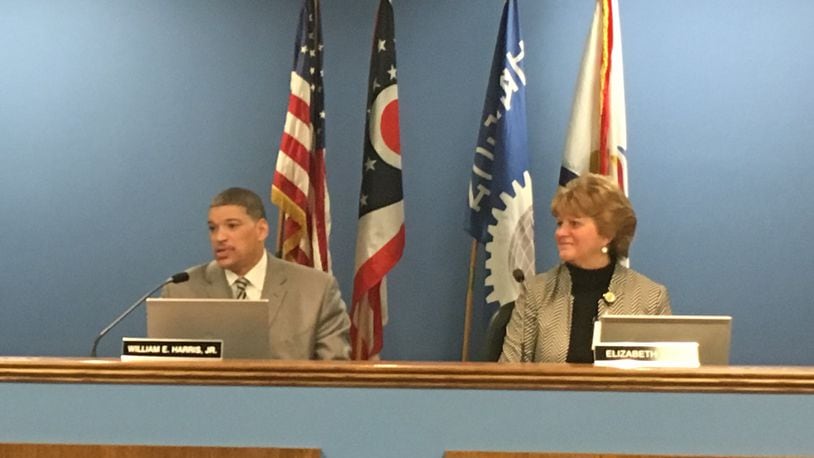RELATED: Corr, DPS reach deal ending her tenure
“Number one, you need strong leadership,” new school board President William Harris said Wednesday. “The person at the top must be capable, competent and be able to lead this district, with many of its challenges, and understanding the urban environment. That person has to be strong enough to make decisions that are difficult, to be fiscally responsible and to communicate effectively from the top all the way down.”
Dayton parted ways with Corr on Tuesday, approving a separation agreement that pays her roughly $103,000 in salary, plus pension contributions and health care benefits through July. The board had accused her of unprofessional behavior and creating a hostile work environment, citing an attorney’s report, just seven weeks after giving her a great performance review.
Harris said Wednesday that the school board has not yet discussed whether they will do a national search or hire a local candidate. Acting Superintendent Elizabeth Lolli has declined comment on whether she is interested in the job on a permanent basis.
RELATED: Here’s why DPS put Superintendent Corr on leave
What Lolli did talk about Wednesday was a need for stability for DPS teachers and staff.
“You’re constantly in this state of ‘let’s try this, let’s try that’ on curriculum, resources, technology … Dayton has been that way for at least the last seven years,” Lolli said. “We go from thing to thing to thing, instead of allowing teachers to focus on what will work, if we allow it to work.”
Lolli acknowledged that there is more change coming before DPS gets to that point, on educational technology, as well as the likelihood of closing a few schools. School closures would lead to more teachers changing buildings and grade levels, which Lolli said has caused issues in the past.
“Once we get through this phase of change, once we stabilize the buildings and properties, that not only stabilizes our ability to place teachers where they need to be and have our students served the best we can, it also stabilizes the finances,” Lolli said.
RELATED: Task force meets; Lolli says DPS not closing 9 schools
DPS has seen huge change in the past few years. The school board non-renewed the contracts of Superintendent Lori Ward and Treasurer Craig Jones in February 2016, replacing them four months later with Corr and Hiwot Abraha, who remains in place.
Many of the district’s top administrators have been in their current roles for less than two years. The district moved many students and teachers around in fall 2016 when they switched most of their Pre-K through 8 schools to Pre-K through 6, meaning students would go to newly configured middle schools for grades 7 and 8.
And four of the seven school board members now in charge were just elected in November — with Harris ascending quickly to the president’s chair — so they are trying to navigate the learning curve of Ohio education policy.
RELATED: Residents weigh in as task force prepares to meet
One district leader who has been in place longer is teachers union President David Romick, who is in his eighth year in that role. He agreed strongly with Lolli’s call to decide on a plan, implement it, then have the patience to let it work.
“You prioritize the top three or four things, you get those done and then let the stew cook for awhile,” Romick said. “You can’t keep adding and adding and changing ingredients, or you’re going to ruin the dish.”
Romick said teachers were upset with how the district’s computer-per-student initiative was rolled out hurriedly “without enough study or data to be beneficial to anybody.” He said teachers have a little bit of hope based on more recent training, but cautioned that it’s too early to see results.
RELATED: DPS focuses on academics, long-term vision
Romick and Harris both talked about efforts needed to rebuild trust in the community after Corr was hired, had her contract extended, then was suddenly gone. Romick talked about the need for clear, repeated messaging to the public on how the district is trying to improve.
Harris said the board has to make responsible decisions that show parents DPS is prioritizing the educational success of their children. He said a diligent process to select the next superintendent is part of that.
City Commissioner Jeff Mims – who is a former teacher, coach, teachers union president and school board president in DPS – said much will come down to the interplay of three people.
“I served on the Council of Great City Schools executive board, and it was the schools that had three things working – a cooperative superintendent, teachers union president and school board president,” Mims said. “The key thing is getting the right leaders, and getting them on the same page.”
YEAR IN REVIEW: Top Ohio, Dayton education stories of 2017
Those three are currently Lolli, Romick and Harris. Mims said in the 1980s, when he was union president, he worked and trained together with board president Joan Pettiford and superintendent Franklin Smith, leading to a period when in-district relationships were better, the community had more confidence, and levies passed.
“There has to be more than just a will to do the right thing, you have to have the training to know what the right thing is,” Mims said. “Then if you can push it down to each level of the district, it’s a success.”
About the Author
